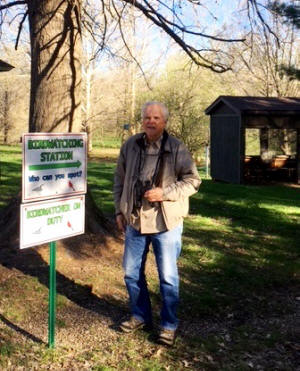|
Birdwatching at Kickapoo Creek
Park
 Send a link to a friend
Send a link to a friend
 [May 01, 2019] [May 01, 2019]
Saturday, April 20 dawned bright and clear in Lincoln, with a slight
nip in the air. By 8 am, Kickapoo Creek Park was bustling with early
walkers and joggers.
University of Illinois Extension Master Naturalist volunteer Mark
Tebrugge was on hand at the birdwatching station near the park
office, checking out the birds visiting the many feeders by the
station. Fellow Master Naturalist Volunteer Pam Moriearty stopped by
to see how the morning was going.
In the first half-hour, Tebrugge had noted 15 species at or near the
feeders. Aside from the familiar redwing blackbirds, blue jays,
cardinals and chickadees, Tebrugge had spotted a red breasted
nuthatch, a brown thrasher and a yellow-rumped warbler. “This is
prime birdwatching time,” he explained. “Both the permanent
residents and migrants are easy to see, because the trees aren’t
leafed out.” Moriearty agreed, “This is the season for romance among
the birds, and they’re putting on a show. A month from now they’ll
be busy feeding a nestful of babies and won’t have a lot of time to
sit around and pose.”

The Kickapoo Creek Park birdwatching station will be manned
periodically through the end of May by experienced birdwatchers to
help visitors identify the many species that visit the feeders.
Master Naturalist volunteers will be on duty from 8 a.m. for a
couple hours each Saturday in May, weather permitting.
[to top of second column] |


Observers are likely to see at least three species of woodpecker, nuthatches,
titmice and finches, among others. Colorful orioles or rose breasted grosbeaks
also stop by occasionally. Checklists are provided so visitors can keep tabs of
their observations.
When Master Naturalists are on duty, the station’s sign will display a special
“Birdwatcher on Duty” panel. At other times, species identification is aided by
large colored posters on the walls. The station, enclosed on three sides and
with benches next to the windows, was constructed a few years ago by Master
Naturalist volunteers. It is always accessible and a fun stopping point for all
ages. The feeders are regularly stocked by park staff with a wide variety of
food offerings.
[Jennifer Fishburn
Horticulture Educator
UNIVERSITY OF ILLINOIS EXTENSION] |